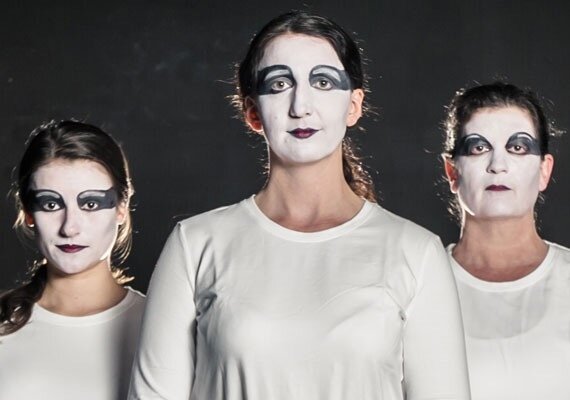There are those who are of the mind that children’s theatre should be the best sort of theatre, the most entertaining and highest quality. The sad reality is that children’s theatre is occasionally a dumping ground for sub-par efforts.
But the Ethereal Mutt production of Demon Dreams (at West of Lenin through November 10; tickets) does not need to be sub-par children’s theatre. Despite a large amount of simplistic verse that suggests an attempt to bridge conventions of hip-hop and kabuki, Tommy Smith’s script shows promise. In the hands of the right director that promise might well be realized, but AJ Epstein is not that director at this time.
The plot of Demon Dreams consists of a showdown performance of Japanese-inspired fables between three demons and the three women who seek shelter in their hut. The threads of the fables and their frame are smartly woven, but played with the broad style of acting endemic in children’s theatre. This almost works for the demons. Matthew Aguayo, Chris MacDonald, and Carter Rodriguez are freed to play and do so with strong commitment. Epstein has hamstrung Susanna Burney, Sara Peterson, and Heather Persinger with a calm, ethereal style that does not lend itself to the precise, shape-shifting transitions required by the script nor Smith’s awkward attempts at hip-hop.
Initially the hip-hop breaks suggest the weak rap of the Witch from the Sondheim/Lapine musical Into The Woods. Repeated forays into the form do not improve the impression, and by the third iteration we’ve stopped listening to the content in favor of cowering till the ordeal has passed. This is not entirely a problem of writing. Carter Rodriguez, who directed the music and created the instruments, manages to make the language and rhythm of his number entertaining. His unexpected syncopation works against the prevailing metric structure, reminiscent of Dr. Seuss or the white politician rap of the Warren Beatty film Bulworth.
The accompaniment to the verse is all live percussion using props and the minimal set pieces. A metal belt used as a kind of chime is especially clever and key phrases break into melody. This is all reasonably effective and pleasantly homespun but needs a stronger rhythmic grounding and more confident vocal performance.
Demon Dreams’ largest failure may be in its marketing. The form, content, and running time all suggest a work that invites the attention of families but it is marketed and run as typical theatrical fare with an 8:00 p.m. curtain. There are no scheduled matinees. All this would be forgivable if the production lived up to its potential as an entertainment accessible to all ages. Instead Smith, Epstein, et al., have opted to talk down to their audience, delivering children’s theatre style in an adult setting.
